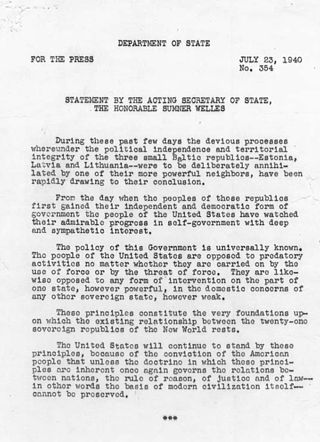Related Research Articles

The Stimson Doctrine is the policy of nonrecognition of states created as a result of a war of aggression. The policy was implemented by the United States government, enunciated in a note of January 7, 1932, to the Empire of Japan and the Republic of China, of non-recognition of international territorial changes imposed by force. The doctrine was an application of the principle of ex injuria jus non oritur. Since the entry into force of the UN Charter, international law scholars have argued that states are under a legal obligation not to recognize annexations as legitimate, but this view is controversial and not supported by consistent state practice.
A brocard is a legal maxim in Latin that is, in a strict sense, derived from traditional legal authorities, even from ancient Rome.
Jus sanguinis, meaning 'right of blood', is a principle of nationality law by which nationality is determined or acquired by the nationality of one or both parents. Children at birth may be nationals of a particular state if either or both of their parents have nationality of that state. It may also apply to national identities of ethnic, cultural, or other origins. Citizenship can also apply to children whose parents belong to a diaspora and were not themselves citizens of the state conferring citizenship. This principle contrasts with jus soli, which is solely based on the place of birth.

The just war theory is a doctrine, also referred to as a tradition, of military ethics that aims to ensure that a war is morally justifiable through a series of criteria, all of which must be met for a war to be considered just. It has been studied by military leaders, theologians, ethicists and policymakers. The criteria are split into two groups: jus ad bellum and jus in bello. The first group of criteria concerns the morality of going to war, and the second group of criteria concerns the moral conduct within war. There have been calls for the inclusion of a third category of just war theory dealing with the morality of post-war settlement and reconstruction. The just war theory postulates the belief that war, while it is terrible but less so with the right conduct, is not always the worst option. Important responsibilities, undesirable outcomes, or preventable atrocities may justify war.
A peremptory norm is a fundamental principle of international law that is accepted by the international community of states as a norm from which no derogation is permitted.
Jus ad bellum, literally "right to war" in Latin, refers to "the conditions under which States may resort to war or to the use of armed force in general". This is distinct from the set of rules that ought to be followed during a war, known as jus in bello, which govern the behavior of parties in an armed conflict.
International humanitarian law (IHL), also referred to as the laws of armed conflict, is the law that regulates the conduct of war. It is a branch of international law that seeks to limit the effects of armed conflict by protecting persons who are not participating in hostilities and by restricting and regulating the means and methods of warfare available to combatants.
Customary international law are international obligations arising from established or usual international practices, which are less formal customary expectations of behavior often unwritten as opposed to formal written treaties or conventions. Customary international law is an aspect of international law involving the principle of custom. Along with general principles of law and treaties, custom is considered by the International Court of Justice, jurists, the United Nations, and its member states to be among the primary sources of international law.
The principle of postliminium, as a part of public international law, is a specific version of the maxim ex injuria jus non oritur, providing for the invalidity of all illegitimate acts that an occupant may have performed on a given territory after its recapture by the legitimate sovereign. Therefore, if the occupant has appropriated and sold public or private property that may not legitimately be appropriated by a military occupant, the original owner may reclaim that property without payment of compensation. It derives from the ius postliminii, of Roman law. The codification of large areas of international law have made postliminium to a great extent superfluous though. It may either be seen as a historical concept, or a term generally describing the consequences to legal acts of an occupant after the termination of occupation.
Ex turpi causa non oritur actio is a legal doctrine which states that a plaintiff will be unable to pursue legal relief and damages if it arises in connection with their own tortious act. The corresponding Ex turpe causa non oritur damnum, "From a dishonourable cause, no damage arises" is a similar construction. Particularly relevant in the law of contract, tort and trusts, ex turpi causa is also known as the illegality defence, since a defendant may plead that even though, for instance, he broke a contract, conducted himself negligently or broke an equitable duty, nevertheless a claimant by reason of his own illegality cannot sue. The UK Supreme Court provided a thorough reconsideration of the doctrine in 2016 in Patel v Mirza.

On two occasions the Israeli Government has been instructed by the Supreme Court of Israel (SCI) to alter the route of the barrier to ensure that negative effects on Palestinians would be minimized and proportional.
International law is the set of rules, norms, and standards that states and other actors feel an obligation to obey in their mutual relations and generally do obey. In international relations, actors are simply the individuals and collective entities, such as states international organizations, and non-state groups, which can make behavioral choices, whether lawful or unlawful. Rules are formal, often written expectations for behavior and norms are less formal, customary expectations about appropriate behavior that are frequently unwritten. It establishes norms for states across a broad range of domains, including war and diplomacy, economic relations, and human rights.

The three Baltic countries, or the Baltic states – Estonia, Latvia, and Lithuania – are held to have continued as independent states under international law while under Soviet occupation from 1940 to 1991, as well as during the German occupation in 1941–1944/1945. The prevailing opinion accepts the Baltic thesis that the Soviet occupation was illegal, and all actions of the Soviet Union related to the occupation are regarded as contrary to international law in general and to the bilateral treaties between the USSR and the three Baltic countries in particular.

Ius or Jus in ancient Rome was a right to which a citizen (civis) was entitled by virtue of his citizenship (civitas). The iura were specified by laws, so ius sometimes meant law. As one went to the law courts to sue for one's rights, ius also meant justice and the place where justice was sought.
Facts on the ground is a diplomatic and geopolitical term that means the situation in reality as opposed to in the abstract. The term was popularised in the 1970s in discussions of the Israeli–Palestinian conflict to refer to Israeli settlements built in the occupied West Bank, which were intended to establish permanent Israeli footholds in Palestinian territory.

The Welles Declaration was a diplomatic statement issued on July 23, 1940, by Sumner Welles, the acting US Secretary of State, condemning the June 1940 occupation by the Soviet army of the three Baltic countries – Estonia, Latvia, and Lithuania – and refusing to diplomatically recognize their subsequent annexation into the Soviet Union. It was an application of the 1932 Stimson Doctrine of nonrecognition of international territorial changes that were executed by force and was consistent with US President Franklin Roosevelt's attitude towards violent territorial expansion.
Ex factis jus oritur is a principle of international law. The phrase is based on the simple notion that certain legal consequences attach to particular facts. Its rival principle is ex injuria jus non oritur in which unjust acts cannot create law.

Stone & Rolls Ltd v Moore Stephens[2009] UKHL 39 is a leading case relevant for UK company law and the law on fraud and ex turpi causa non oritur actio. The House of Lords decided by a majority of three to two that where the director and sole shareholder of a closely held private company deceived the auditors with fraud carried out on all creditors, subsequently the creditors of the insolvent company would be barred from suing the auditors for negligence from the shoes of the company. The Lords reasoned that where the company was only identifiable with one person, the fraud of that person would be attributable to the company, and the "company" could not rely on its own illegal fraud when bringing a claim for negligence against any auditors. It was the last case to be argued before the House of Lords.

Iura novit curia is a Latin legal maxim expressing the principle that "the court knows the law", i.e., that the parties to a legal dispute do not need to plead or prove the law that applies to their case. The maxim is sometimes quoted as jura novit curia, iura noscit curia, curia iura novit, curia novit legem or variants thereof.

The moral equality of combatants (MEC) or moral equality of soldiers is the principle that soldiers fighting on both sides of a war are equally honorable, unless they commit war crimes, regardless of whether they fight for a just cause. MEC is a key element underpinning international humanitarian law (IHL)—which applies the rules of war equally to both sides—and traditional just war theory. According to philosopher Henrik Syse, MEC presents a serious quandary because "it makes as little practical sense to ascribe blame to individual soldiers for the cause of the war in which they fight as it makes theoretical sense to hold the fighters on the two sides to be fully morally equal". The moral equality of combatants has been cited in relation to the Israeli–Palestinian conflict or the U.S.-led wars in Iraq and Afghanistan.
References
- ↑ "Glossary of International Law Terms". University of Washington School of Law. Retrieved 2009-05-06.[ permanent dead link ]
- ↑ Brigitte Stern (1998). Dissolution, continuation, and succession in Eastern Europe. Martinus Nijhoff Publishers. ISBN 978-90-411-1083-1.
- ↑ Tim Hillier (1998). Sourcebook on public international law. Routledge. ISBN 978-1-85941-050-9.